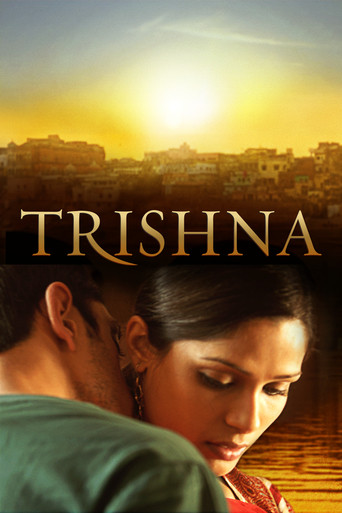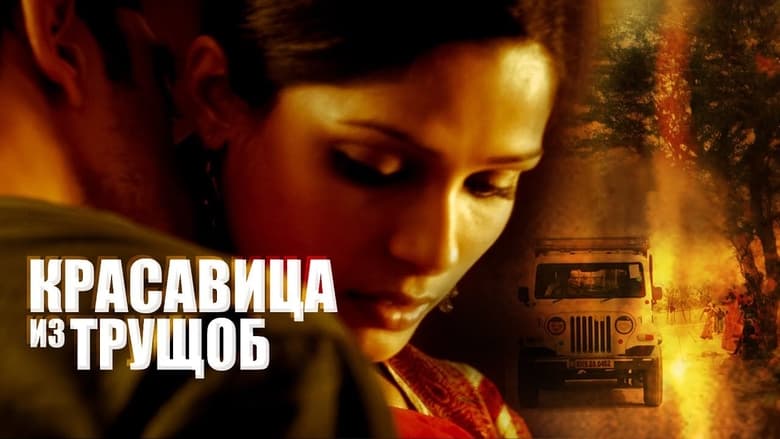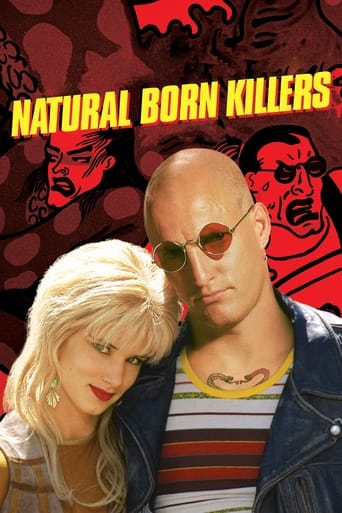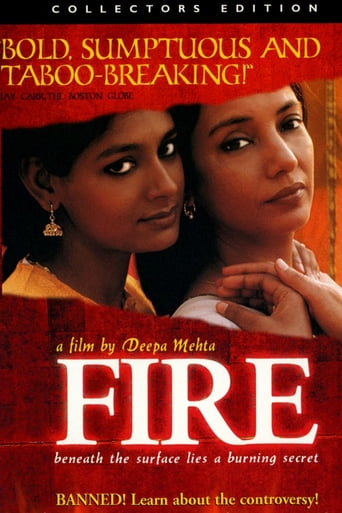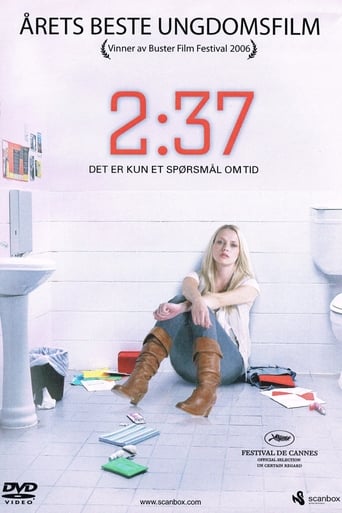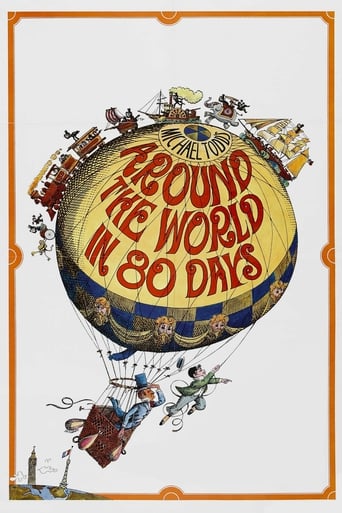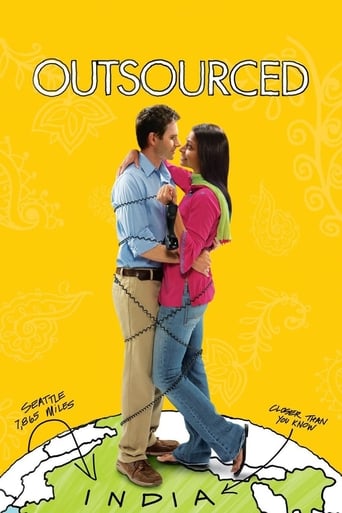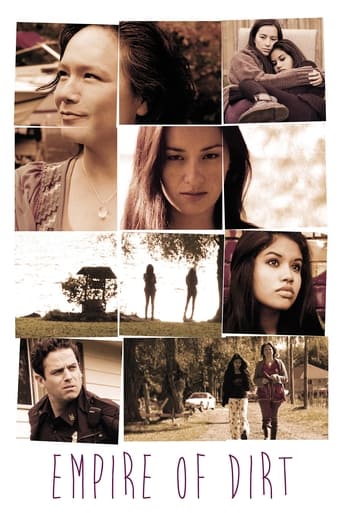Trishna (2012)
When her father is killed in a road accident, Trishna's family expect her to provide for them. The rich son of an entrepreneur starts to restlessly pursue her affections, but are his intentions as pure as they seem?
Watch Trailer
Cast
Similar titles

Reviews
Wonderful character development!
Highly Overrated But Still Good
Blistering performances.
Through painfully honest and emotional moments, the movie becomes irresistibly relatable
I understand that its an adaptation of a popular novel. But placing the happenings of the novel in India has done only more damage than good. 19th Century Britain is not modern India!! The way the movie depicts India is very pathetic - there is not an iota of logic in the movie when a girl from a protective, joint family all of 19 years old suddenly decides to run off with this English speaking fellow without having any demands.A village girl in India will have self-respect a million times more than an average girl from the city. And her family will be all too protective of the girl. Therefore it is unacceptable for this village belle to be unmarried at 19 and worse being sent away to unknown place for work. A village girl from India will not so naive!!! May be good adaptation of the book - but placing it in India is the biggest flaw in this movie. Do not watch if you know at least little about Indian villages and their culture.
As simple, inconsistent, and implausible this movie was, I still feel like it has a certain richness, a mood that is melodramatic but so incomplete as to be almost trite, and an eroticism both tedious and provocative. Unfortunately, the movie's half-hearted sense of duty towards a novel creates an ending that is implausibly detached from the rest of the story. Beautiful Trishna is seen by Jai, a lad of the upper class. He becomes smitten by her, and then some. Trishna is shown as someone who has taken all the kicks life could dish out and grown accustomed to them with a polite smile. What truly goes on in her mind we are not clearly shown, but by her attitude of consistent formality and subservience to Jai it is obvious that she entertains no delusions about her place in the great and rigid hierarchy of humanity. Her actions and character are interesting and engaging right up to the parts before the last third of the movie. Before those scenes, I could perceive her as a completely realized character. In the last third, however, the characters and their relationship become simplistic and exaggerated, and no motives are given for their changed actions. Jai increasingly becomes inconsiderate of Trishna's humanity, and increasingly treats her as a harlot, which causes Trishna to suddenly fatally attack him. Why Jai changes from a lover who teaches Trishna to whistle and takes her to walks by the beach, to someone who lies around reading all day, waiting for Trisha to bring lunch to him, and then upon her arrival immediately starts sexual activity with her, is unexplained. It is clear that from the start he treated Trishna as a servant, and continues till the very end, but at final third of the story, without any reason, his tenderness suddenly vanishes. Is it Jai's imposed duties by his father that are making him so cold and abusive? Or is his inner sadistic and domineering darkness expressing itself fully? If so, there is little transition or explained cause.Trishna's motive for her final blow is unclear as well. It is clear that Trishna was not taken forcibly by Jai. Unfairly? Yes. Whenever he reached to some end of the world to pick her up, he asked her and she agreed. Right up until a few minutes before she stabs him, she is wordlessly, politely, and passively serving him, reciprocating his kisses and does not seem to shrink from intercourse. Then, all together, she whispers her first few denials, shrinks from his touch, cries during intercourse/ rape, and just as immediately goes and stabs him. I was honestly expecting her to change her game and leave him; that was the only logical progression from her attitude and development. If it was a matter of money, she could have gone back to Mumbai and become a screen dancer, she even had an offer of employment there, and she loved to dance. The only way this type of ending works if there is boldly expressed passion throughout the story. It is ambiguous (but naturally so) whether Jai's inconsolable lust is a part of his love (or some other feeling) for her. Trishna's constant yielding towards Jai, despite his unfairness and abusive neglect, also shows her love for him. But this love is never really projected in a way to justify Jai's murder. The master and servant relationship seems to have been agreed upon from the start, and its participants do not deviate from their expected behavior at any time. Therefore, when this relationship becomes thwarting and violating for Trishna, her reaction to it is confusing. She was being abused from the start with her own passive acceptance. Why the sudden fatally violent counter? Another highly inconsistent matter is the treatment of sex. There is no on-screen sex in almost the first half of the movie. Then, suddenly, a little while after they move together to Mumbai, the on-screen sex is non-stop. Near the end it is so repetitive that it can come across as gratuitous and tedious. Jai's insatiable lust makes him out to be disgusting and worthless, but still not worthy of death. Therefore, when it comes, it seems baseless. All in all, it seems to me that the ending was chosen simply to fit the label of an adaptation. It basically ruins the movie. A far better ending (and movie) would have been for Trishna to break her servitude by leaving Jai, not by killing him.
Michael Winterbottom's "Trishna" is the fourth theatrical adaptation of Thomas Hardy's 1891 novel "Tess of the d'Urbervilles." The first two adaptations, silent films released in 1913 and 1924 respectively, have since been declared lost. The next adaptation, however, was well preserved even before its American premiere in 1980. This would be Roman Polanski's "Tess," a romantic melodrama that, like the novel, was set in Victorian England. "Trishna," a modernized retelling that shifts the setting to India, is very much like "Tess" in that it tells the story of an innocent young woman whose life is ultimately destroyed by love, societal values, unfortunate turns of events, and above all, male dominance. It's tragic, but not unnecessarily so; we understand the gravity of the situation, and we recognize that the conclusion is inescapable.Trishna (Freida Pinto) lives a meager existence with her large family in a village in Rajasthan. The eldest daughter, she helps pay the bills by working at a nearby resort as a greeter and cocktail server. It's during one of her night shifts that she meets a British businessman named Jay (Riz Ahmed), the son of an ailing but wealthy property developer (Roshan Seth). Jay has come to India at his father's request to manage a luxury resort in Jaipur. His initial meeting with Trishna was essentially only a casual encounter; it isn't until her father destroys his Jeep and hurts himself in an accident that their relationship becomes much more serious. That's when Jay offers Trishna the chance to work at his hotel for a relatively sizeable sum, enough to provide for her family. During her time as his employee, they fall in love, and in due time, they have sex.In Polanski's film, Tess is raped and soon thereafter gives birth to a sickly baby that immediately dies. In Winterbottom's film, Trishna's inevitable pregnancy is terminated under duress from her father, who is, to put it mildly, old fashioned. In both films, the title characters have been saddled with the same secret, one that could forever ruin a potentially happy life with the men they love. Jay, a combination of the Alec Stokes-d'Urberville and Angel Clare characters from "Tess," is initially not made aware of Trishna's pregnancy or the resulting abortion, allowing for scenes that give Trishna hope for a better life. She and Jay eventually move to Mumbai, where both dabble in the Bollywood scene, Trishna in front of the camera and Jay behind. The cracks eventually begin to show on their seemingly solid relationship, most interestingly when they tour their new apartment and Jay shows Trishna the kitchen.Although Jay seems to be in love with Trishna, he will in due time make the most astounding of transformations, namely from a charming young man into a controlling monster. Ideally, Trishna would have been able to approach him with news of her pregnancy. Realistically, she's part of a culture where having a child out of wedlock is considered disgraceful, not just for the woman but for her family as well. This is despite the fact that there have been advancements in economic growth, mobility, and education, both in urban and rural areas. With this in mind, exactly how could Trishna confess to Jay? You'd think he'd be more progressive, considering his British upbringing, but the truth is that he's essentially a spoiled brat who flaunts his status as a fiancée would her ring.The other side of the issue is Trishna's father, a man so traditional that not even the good money she earns can persuade him to look past her sin – which, incidentally, may not have been a sin at all but rather an act that was forced upon her. So now it comes down to an issue we tend to dance around, especially in circumstances like this: Was it consensual, or was it rape? It may not be as clear cut as it seems; Jay's initial act of kindness, coupled with his handsome looks and alluring demeanor, effectively reduced the naïve and impressionable Trishna into a state of total submission, which is to say that she probably would have jumped off a cliff if he asked her to do so. It was more mental than physical, I believe. He took advantage of a situation by seducing her. Regardless, her resulting pregnancy made her damaged goods in the eyes of her father.This, combined with Jay's drastic personality shift, paves the way for a deeply unpleasant yet highly appropriate ending. Unlike "Tess," in which the possibility of a happy turnaround carried through to the final shot, "Trishna" makes it abundantly clear that no such possibility exists. The title character is nothing more or less than a hapless victim of circumstance. If my description of this movie has made it sound like an overwrought soap opera, you should know that I don't believe the plot was intended to be the main focus. It's really more about character development, specifically in relation to culture, and theme. We see that Trishna is in distress, and we feel her pain, and within the context of the story, we understand the reasons behind every decision she makes.-- Chris Pandolfi (www.atatheaternearyou.net)
Filmmakers never have been able to resist indulging their love for the good ol' English canon by churning out their own rendering of classic novels. Last year was no exception, with the likes of Cary Fukunaga's Jane Eyre and Andrea Arnold's Wuthering Heights hitting our screens. But while these were both pretty decent efforts, overall they provided little more than an opportunity for the well-versed viewer to compare them to previous outings and mull over their treatment of the source material.As such, the classic novel adaptation has become little more than a type of genre flick, in which we are invited to watch a director wrestle with a well-worn story. Transposing Thomas Hardy's tragic novel Tess of the d'Urbervilles from Victorian Wessex to modern day India, as Michael Winterbottom has done with Trishna, appears on the surface to be little more than another gimmicky relocation of a classic tale. This film, however, manages to do justice to Hardy's themes whilst carving out a discernibly different kind of work that can be watched and enjoyed with fresh eyes.Hardy was writing in a period of dramatic ideological and economic transition. Victorian censoriousness was still grappling with post-Reformation libertinism while the Industrial Revolution was encroaching upon and modernising the rural world. Tess is a heroine caught in the crossfire of warring moralities. Winterbottom deftly reinterprets the character as Trishna (Freda Pinto), a teenager from a poor family, who is torn between the traditional values of her homeland in rural Rajasthan and the social and sexual liberation she later finds in Mumbai.Winterbottom has stated that he chose India because it currently bears similar ideological divides to those of nineteenth century Britain, but he in fact paints a more complex and modern picture. Far from being the 'pure woman' of Hardy's novel, whose downfall took place in spite of her moral rectitude, Trishna is a conflicted character who is grounded in the old world but drawn to the bright lights of the new.In place of the pious Angel Clare, who Tess falls in love with, and the rakish Alec d'Urberville, who robs her of her virtue, we are given Jay Singh (Riz Ahmed), a conflation of both characters. A British-born rich kid, he comes to Rajasthan to work for his father's chain of hotels and takes a shine to Trishna. The two begin to fall in love, but he unwittingly leads her to disgrace herself by succumbing to his advances. Growing tired of hiding their relationship, he suggests they leave for Mumbai, where they can live together, free from scorn.Although perhaps a little insensitive, Jay is every bit the honest and loving Angel Clare of the narrative, until a return to Rajasthan leads his darker, d'Urbevillian side to show itself. Managing one of his father's hotels, a former harem, he revels in subordinating Trishna to his depraved appetites, until she is forced to take revenge.Unlike Hardy's novel of black-and-white morality embodied by wholesome heroines and seedy villains, these modernised characters have internalised these conflicts. Winterbottom's adaptation insists upon its modern setting, and refuses to impose Hardy's hundred-year-old dynamic onto it. Trishna's downfall isn't a journey from honour to disgrace, but a process by which she is isolated between two different notions of piety, and taken advantage of by her malevolent lover. Not only does this prevent Winterbottom from casting aspersions on traditional or indeed modern values, it also makes for a far more convincing appropriation of the novel.Although Winterbottom is given a writing credit, the script was apparently little more than a set of vague outlines from which the actors were expected to improvise the dialogue. Luckily, the leads are more than up to the task, and their off-the-cuff performances lend well to portraying a tentative courtship between two different cultures. The early scenes in which Jay has to overcome the language barrier to get Trishna's attention are a naturalistic joy, yet even as things take a more dramatic turn, Pinto and particularly Ahmed remain startlingly believable.Their improvised riffs help to cast the characters into entirely different moulds, while the embrace of the Indian aesthetic allows the setting to stake new ground within the story as well. Whether Winterbottom is diving head first into the throng of the city or nestling the camera in the rugged hills of the countryside, his loose and intuitive style takes each locale as it is, capturing it with intelligence and warmth. The soundtrack, featuring a selection of original Bollywood numbers, bounces off the visuals wonderfully, whilst the incorporation of an on-screen translation of the Hindi lyrics proves a novel and expressive addition. Rather than treating India as a mere stand-in for old-world England, Winterbottom attends to it dutifully, helping to create the film's distinctive flavour.Whether you've read Tess or not, love a good adaptation or usually find them cosy, generic tripe, there's plenty to enjoy with Trishna. Instead of just guising an old story in contemporary garb, Winterbottom truly reinterprets it and in doing so finds resonance with a modern audience. Most impressively, it is an adaptation that stands firmly on its own two feet, and graces us with some inimitable and elegant performances.
